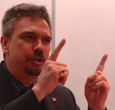
Toward a Liberative Pedegogy
Since the start of the twentieth century, Christian religion scholars from the dominant culture - specifically ethicists – shifted their focus on how to live the Christian life via praxis toward the nature of ethics, wrestling more with abstract questions concerned with what is the common good and/or which virtues to cultivate. An attempt is made to understand the world, but lacking the ability to differentiate within disenfranchised communities between a “blink and a wink,” à la Geertz, their final analysis lacks gravitas. Teaching religion has become a process which [de]liberates not liberates. While abstract deliberations at times might prove sympathetic to the plight of the oppressed, the first casualty of abstract thought is rigorous academic discussions concerned with how to construct a more just social structure based on faith claims.
A move to the abstract has, as my dissertation chair John Raines constantly reminded me, made the [class]room an appropriate name which signifies what occurs. This “room of class” becomes a space where students learn the class to which they belong, and how to assume the responsibilities associated with that class. During a visit to Yale, a student reminded me that while most seminaries train ministers for churches, Yale trains future bishops and superintendents. I doubt if such an attitude is limited to just one of the Ivies. Those with sufficient capital or connections to attend certain “rooms of class” on prestigious campuses are afforded opportunities normally denied to others (predominately students of color) who attend rooms at less prestigious locations.
To occupy [class]rooms attached to power and privilege means that what is taught focuses more on the abstract as opposed to praxis designed to subvert power and privilege. To some degree, most eurocentric approaches to pedagogy at prestigious [class]rooms, more often than not, focus on explaining what is religious. But for those rooted in (or in solidarity with) disenfranchised communities relegated to the underside of prestigious [class]rooms, the question is not so much to determine some abstract understanding of religion, but rather, in the face of dehumanizing oppressive structures, to determine how people of faith adapt their actions to serve the least among us.
Some professors who embrace a more liberative approach to pedagogy recognize there is no such thing as a neutral education system. Rather, students, depending on the [class]room they attend, are either conditioned to domesticate or be domesticated. A theological education serves to normalize and legitimize existing power structures within the faith community and society. A liberative pedagogy instead seeks to cultivate the student’s ability to find their own voice by creating an environment where collective and individual consciousness can be raised. The starting point is not some truth based on church doctrine or rational deliberation. Instead, the starting point is analyzing the situation faced by the dispossessed of our world and then reflecting with them theoretically, theologically, and hermeneutically to draw pastoral conclusion for actions to be taken.
To function in the [class]room as a scholar-activist is usually to be dismissed, especially if one chooses not to engage in the methodologies acceptable to eurocentric thought. A division, unfortunately, exists where those concerned with the importance of maintaining their privileged space in [class]rooms oozing with power insist on lessons revolving around the thoughts and ideas of mainly dead white scholars (and those soon to join them) dismissing scholar-activist and the scholars from marginalized communities who inform their own thoughts. Simply peruse the reading lists on syllabi at prestigious [class]rooms to notice how scholars from disenfranchised communities are ignored – except, of course for that one elective class offered to check off the political correctness box. The [class]room space is protected with a call not to engage in the politics of our society, but instead to limit our thoughts to the polity that is the church, usually a homogenous church which more often than not misses the mark.
The calling to be a scholar-activist is a recognition that by seeking solidarity with the stone rejected by stale builders regurgitating dead thoughts incapable of saving anyone, one finds themselves among the cornerstone of relevant, cutting-edge scholarship capable of revolutionizing society, literally turning the world upside-down.
Leave a Reply